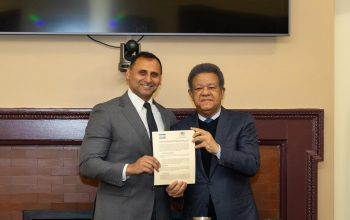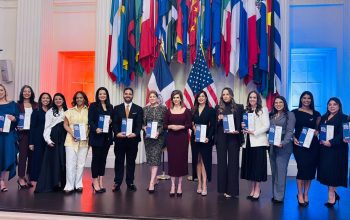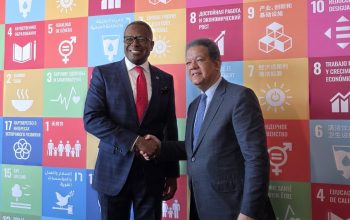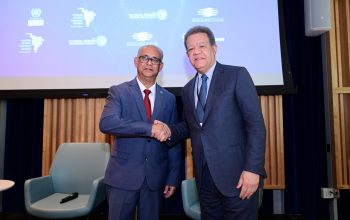news
GFDD Proud to Host Special Panel Womens Empowerment in Developing Country Democracies
March 6, 2012
On Tuesday, March 6, 2012, GFDD was honored to host a special panel at the 56th session of the Commission on the Status of Women in partnership with the Mission of the Dominican Republic to the United Nations and the Special Coordinator Civil Society, Office of the President of the General Assembly. The Mission of the Dominican Republic was represented at the Ambassador level by Jose Blanco and thereafter by the Minister Counsellor Mariela Sanchez De Cruz.
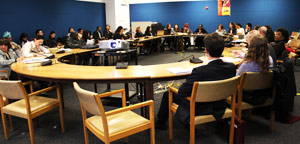
The panel featured presentations by five accomplished and influential women, representing diverse regions of the globe: Dr. Amany Asfour, President of Egyptian Federation of Business & Professional Women, President of Egyptian Business Women Association, President of
the Organization of Women in Trade, President of African Alliance for Women Empowerment, and President of Afro-Arab Network for Women Empowerment, among other titles (Egypt); H.E. Dr. Josephine Ojiambo, Ambassador/Deputy Permanent Representative at the Kenya Permanent Mission to the United Nations in New York (Kenya); Ms. Rita Rosa Álvarez, Executive Director, Mujeres Dominicanas en Desarrollo (MUDE) (Dominican Republic); and Ms. Mildred Espinoza, General Manager/Correspondent for
South-South News (Guatemala).
While these countries have vastly different historical, political and cultural contexts, the shared struggle by women to gain equality and opportunity in traditionally patriarchal societies unifies the nations represented in this panel. The discussion of women’s empowerment comes at a particularly critical time, when populations around the world are rising and demanding more rights. The role of women in the past year’s uprisings, particularly
in the Arab world, has garnered substantial media attention, sparking enthusiasm about the potential of women to bring change, economic growth and stability to their countries.
The event was well attended by over fifty participants representing UN Agencies, Member States, accredited intergovernmental organizations, civil society organizations and private sector entities.
Director in Washington DC, Asunción Sanz, gave the opening
remarks on behalf of GFDD before turning the proceedings over to moderator, Hanifa Mezoui from the Office of the President of the General Assembly.
The first speaker of the afternoon, H.E. Ambassador Ojiambo shed light on the actions being taken by the Government of Kenya to empower women, particularly in the area of governance. Kenya uses quotas to ensure for gender equality within political processes. Kenyan legislation reserves one third of seats, at all level of
government, for women. Along these lines, the government organizes women’s leagues to educate women on political processes. According to the Ambassador, women represent 30% of all political parties, and 11% of seats in Parliament are occupied by women.
Ambassador Ojiambo also called attention to the important role of education in assuring gender equality. Kenya guarantees its citizens access to free, universal primary and secondary education, and is working to afford its
citizens access to free, universal tertiary education.
What is more, the Permanent Representative of Kenya to the United Nations commented on the low representation of women Permanent Representatives to the United Nations. Today, just 20 out of 193 Permanent Representatives to the United Nations are women. Ambassador Ojiambo spoke of the importance of senior female diplomats mentoring younger female diplomats, and referred to the mentoring work she does at the UN and with
students at the university level.
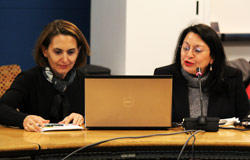
Dr. Anany Asfour shared with the audience the work she is doing to help women to achieve financial independence in Egypt. She ascertained that conditions of unemployment, poverty, illiteracy, lack of political participation
and lack of hope that led Egyptian women to convene in Tahir Square to demand social justice, democracy and good governance.
Dr. Asfour’s foundation offers education, training, capacity building and access to financial resources to women looking to launch start-up businesses. Women entrepreneurs gain access to market places and showrooms to exhibit good; data banks; business incubators; ICT centers; technical assistance; financial and legal services; and support in terms
of technological assistance and product development.
“Financial independence gives you the power of choice and the power of voice,” stated Dr. Asfour. “We cannot achieve sustainable development unless we promote the empowerment of women.”
Picking up on the critical need to give women voice, two-time Emy winner and Regional Manager of South-South News, Mildred Espinoza spoke about the importance of media in achieving political and social change. The
media outlet celebrates the success stories of developing countries, shining a spotlight on issues related to women’s empowerment, public health, education, business and technology, environmental sustainability and culture.
To conclude the afternoon of presentations, Executive Director of Mujeres Dominicanas en Desarrollo (MUDE), Ms. Rosa Rita Álvarez, discussed the ways in which the democratic system in the Dominican Republic has aided to facilitate progress in terms of
gender equality and the advancement of women, making specific reference to the creation of the Ministry of Women’s Affairs and the National Plan for Gender Equality and Equity, 2007-2017. She argued that international agreements have also contributed to the gains achieved on behalf of women in the country.
She expressed that despite existing quotas that reserve 33% of congressional and municipal posts for women, these numbers have not yet be reached. The Executive
Director associated the low rates of representation with lack of financial resources to compete in elections.
Despite the many strides made by women in the Dominican Republic, Ms. Álvarez emphasized that high-rates of teenage pregnancy and gender-based violence still represent challenges to overcome in the Dominican Republic. Ms. Álvarez conveyed great faith in the power of the State to play a prominent role in deconstructing cultural patterns that are disadvantageous to
the well-being and advancement of women.
Due to the high level of interest shown by attendees, the panel ran thirty minutes longer than originally scheduled.
The Commission on the Status of Women is a functional commission of the United Nations Economic and Social Council (ECOSOC). The commission convenes annually at the end of February at the United Nations in New York. It is the principal global policy-making body dedicated exclusively to gender
equality and advancement of women. Every year, representatives of Member States gather at United Nations Headquarters in New York to evaluate progress on gender equality, identify challenges, set global standards and formulate concrete policies to promote gender equality and women’s empowerment worldwide.
The entire event was filmed by South-South News and Alexandra Tabar from GFDD was responsible for all of the still photography taken.
Consultative Status
GFDD and FUNGLODE actively support the work of the United Nations System. In 2004, GFDD and FUNGLODE were admitted to the United Nations System as institutions with consultative status, joining the Economic and Social Council (ECOSOC), the United Nations Conference on Trade and Development (UNCTAD), the Department of Public Information (DPI), the Global Compact Office (UNGC), the Office on Drugs and Crime (UNODC) and the
World Summit on the Information Society (WSIS).
Presentation by Ms. Rosa Rita Álvarez
Biographies of panelists:
Dr. Amany Asfour
Dr. Hanifa
Mezoui
Mildred Espinoza
Amb. Dr. Josephine Ojiambo
Rita Rosa Alvarez
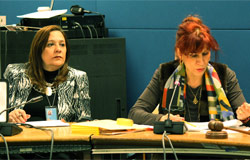 |
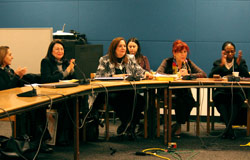 |
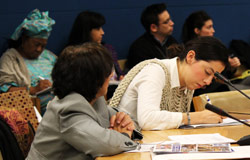 |
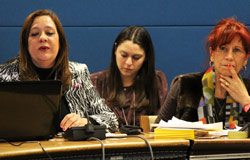 |
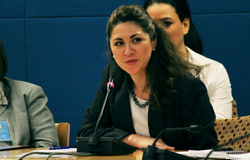 |
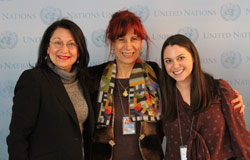 |
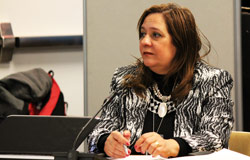 |
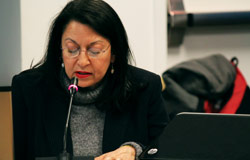 |
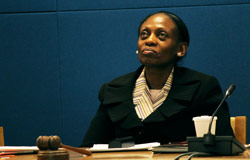 |
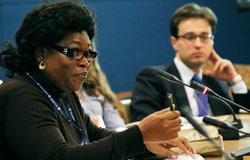 |
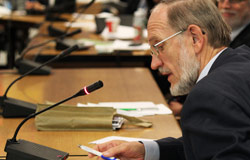 |
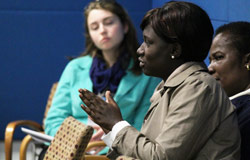 |
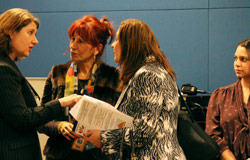 |
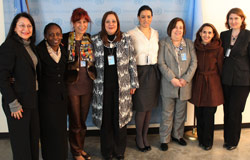 |

